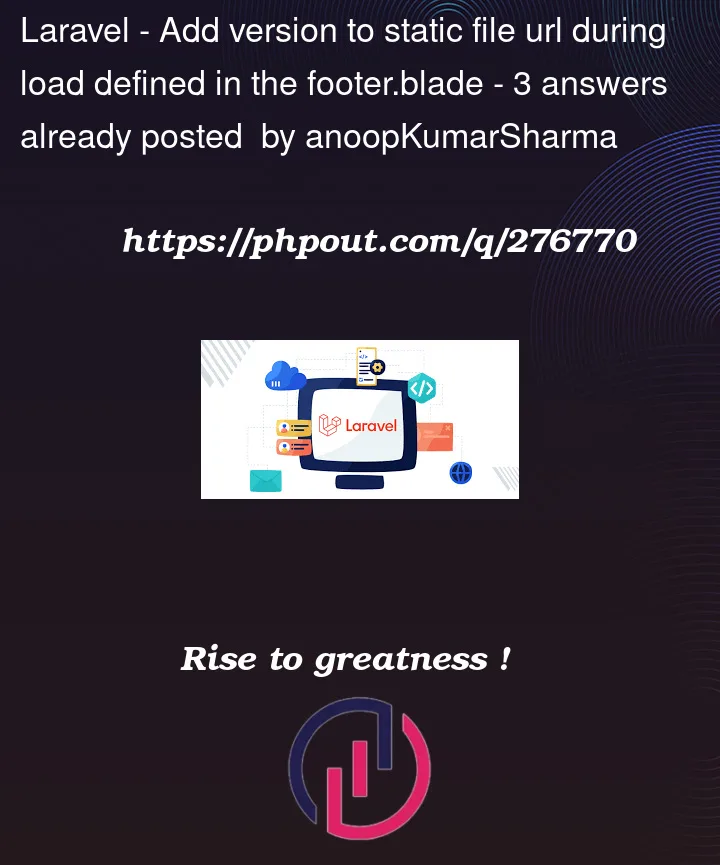I have a footer.blade.php where i load all the js files.
Now i want to append version to url dynamicall
Where globalFileVersion is defined in a separate file which i will not cache using nginx
I have tried couple of ways to achieve this but failed everytime
1- <script src="../../assets/js/main/login.js?v=" + globalFileVersion>
2- import(../../assets/js/main/generateInvoicePhp.js?version=${globalFileVersion})




3
Answers
It seems like you want to append a version dynamically to the URLs of your JavaScript files in a Laravel Blade template. The approaches you’ve mentioned in your question are almost correct, but there are a few issues with your syntax. Here’s how you can correctly achieve this:
In your Blade template (e.g., footer.blade.php), you can use Blade templating to dynamically append the version to the URL. Here’s the correct way to do it:
Make sure that
$globalFileVersionis a variable that’s defined in your Laravel controller or passed to your view. This will replace{{ $globalFileVersion }}with the actual value of the variable.If you are using dynamic imports with JavaScript, you can do something like this:
In this case, make sure that
globalFileVersionis a global JavaScript variable available in your application. You can replace'v='with'version='if that’s the query parameter name you prefer to use.Also, ensure that your server (NGINX or any other web server) is properly configured to ignore caching for the specific file or URL, as you mentioned. Caching can sometimes interfere with versioning strategies, so make sure that your server is set up to handle these dynamic versioned URLs correctly.
Remember that the key to ensuring the version is updated dynamically is to use a variable (either in Blade templates or JavaScript) that changes whenever the version should be updated, and then make sure your server configuration is set to bypass caching for these dynamic URLs.
To define a global variable in a separate PHP file and access it in your Blade template (footer.blade.php), you can do the following:
global_version.php) where you define the global variable:In your footer.blade.php file, you can include the global_version.php file using the
includeorrequirestatement like this:Make sure to replace
/path/to/global_version.phpwith the actual path to your global_version.php file.$globalFileVersionvariable in your Blade template:Now, you can use the
$globalFileVersionvariable in your Blade template like this:Regarding the performance aspect of the second method (dynamic imports), dynamic imports can introduce a slight delay compared to traditional script loading, as the browser needs to fetch and evaluate the imported script on-demand. However, the performance impact is usually negligible, especially if your scripts are not exceptionally large.
Dynamic imports are typically used to load scripts only when they are needed, reducing the initial page load time. If performance is a concern, you can use a combination of traditional script loading for critical scripts that need to load quickly and dynamic imports for non-essential scripts that can be loaded asynchronously.
Ultimately, the choice of method depends on your specific use case and performance requirements. You should analyze your application’s needs and consider which scripts are crucial for initial page load and which ones can be loaded asynchronously.
On the surface, it appears that you’re trying to version your assets to avoid browser/CDN caching, and you’re intending to use quite a naive approach to that – a single variable value that is used for all assets.
A simple answer would tell you how to make the variable aspect render correctly so that your asset URLs all have this dynamic nature to them which will help with cache-busting when you need it to.
There are a few ways to ‘skin this cat’, but as you’re dealing with Blade and likely running in the context of a Laravel application, what you should do is use Laravel’s built-in support for Asset Bundling.
This is going to be a much better implementation than your naive one and has already taken care of so many considerations that you may not have thought through yet or encountered.
For example, while a query string parameter is fine for many caching systems, it can be ignored by some, so what you really want is a dynamically-generated file name.
Also, a single version key that is shared across all assets means that you will not be allowing your own systems or your users’ systems to make the most effective use of their caching strategies, which will translate to unnecessary computation, transfer and storage costs across the stack.
Aside: I’m disappointed to see the other answers here which look like classic ChatGPT/LLM-generated content without even trying to make it look more human.
I’m happy to be wrong in this judgement, but I think it highlights not only how hard it is to spot when this is happening but how poor it currently performs for questions like this, which really require deeper thought and questioning rather than just providing a face-value solution to the problem as presented.